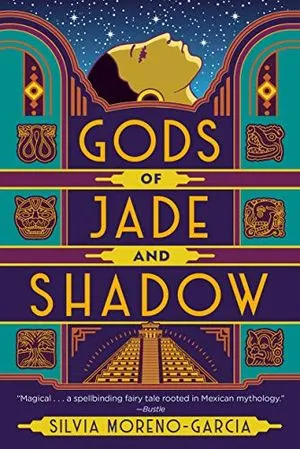
Let Us Be Your Guide: 8 Psychopomps Across Mythology and Literature
We, the Psychopomps, hope this post finds you well and dead and looking for where to go. That’s what we’re here for, after all. Oh, you don’t think you’re dead? No worries there; we can refer you to our superiors once you get to where you’re going. That information — the whys, the hows, the whethers — is quite above our pay grade. Yes, our job is simply to bring you from here to there, there being where you’re going to be for the duration of your death, give or take an eternity.
Here is a pamphlet to read while you’re on the journey with us. For centuries, we’ve been constantly asked questions, which not only distracts us from our duties but also delays how long it takes to get where you’re going. Believe us, you wanna get there. Expediently. Dawdling between here and there only leads to chaos, i.e. hauntings, thinning of the veils, what have you. You can imagine how delighted we were with the invention of reading recommendations and thought we’d make our own. Pardon? Yes, that can be answered in the pamphlet.
Yes, that, too. No, I cannot absolve you; that’s not a thing we do. No. Yes. No. Absolutely not.
If you please, my dear, the pamphlet.
Let Us Be Your Guide
Ahem. We are the Psychopomps: guides across mythologies and religions that help you get from here to there. We have a variety of offerings for your death-quest pleasure, and reading recommendations (the wifi here is quite terrible, darling, reading is better), that may help you choose the best guide and journey experience. At any point, you may change guides, though that may delay your estimated time of arrival, and may require additional charges, depending on the guide. For example, Charon, who doesn’t talk much, requires payment for each trip across the River Styx…
…What? Well, of course, we support the policy: Any working entity should get paid what they’re worth. What, you think AI is going to ferry souls to the afterlife, too? You, mortals, crack us up. Back to the pamphlet, if you please…
Psychopomp comes from the Greek word ψυχοπομπός, which comes from the meaning “guide of souls,” though your Google translate might also say something like “psychic transmitter,” which makes us sound like the embodiment of a Ouija board.
Depending on your culture and beliefs in life, your Psychopomp may take the form of an ancestral spirit, an angel, god of death, or another creature entirely. You might get a demon. You might get a grim reaper. You might get a raven babbling “Nevermore!”. But fear not; whomever you choose will get you where you need to go. Even Virgil, that boring drone, will get you through hell.
Sometimes we Psychopomps are called to your mortal realm, either by accident or on purpose, and sometimes we go there during our PTO days (though that’s becoming less frequent with climate change). In any case, there are many examples in literature that describe our line of work, and hopefully, these recommendations will help answer any questions that pop up as you journey to your permanent home. Some of the examples we’ve included may show instances where we are not quite at our best — everyone has bad days, you know — so don’t judge us too harshly.
Human Psychopomps
Indeed, there are human Psychopomps in our ranks! They have existed as long as there have been underworlds to shepherd them, and a rare few of you mortals in each generation have a knack for guiding those who have died but refuse to pass on.

Galaxy “Alex” Stern from Ninth House by Leigh Bardugo
We won’t say Alex’s formal title, as that would take away some of the fun from your reading experience. Alex is one of those who can talk to ghosts, and in Ninth House, is called to Yale to take on the duties of Lethe House, and oversee the magical rituals of the secret societies at Yale. Alex becomes embroiled in a murder mystery when a few ghosts seek her help.

Ropa from The Library of the Dead by T.L. Huchu
Some mortals decide that the Psychopomp life is better than school. Ropa dropped out of school to become a ghost talker. She speaks to Edinburgh’s dead to pay the bills, but mysteries can be hard to solve. Ropa will use Zimbabwean magic and Scottish pragmatism to finish the job.
Psychopomps as Death/The Grim Reaper and Gods of Death
Some of us have to be both. Guide and god. Guide and master of death. It’s a rough job, doing both, but we manage, and sometimes we have assistance in the form of a partner, human psychopomp, or other spirits. Bear with us, my darlings. Even we need a nap now and then.

Hun-Kame from Gods of Jade and Shadow by Silvia Moreno-Garcia
It’s rough when you’re kicked out of your Psychopomp job (or in this case, overthrown). Hun-Kame, the Maya god of death, former king of the underworld, was overthrown by his twin brother and imprisoned. In 1920s Mexico, Cassiopeia unwittingly breaks open a chest in her grandfather’s bedroom and releases him. Hun-Kame is neither man nor god when free from the chest, but he wants to reclaim his kingdom nonetheless, and enlists Cassiopeia to do it.

Charlie Dawson from The Ferryman Institute by Colin Gigl
The Psychopomp duties are not without controversy, or boredom for that matter. For two hundred years, Charlie Dawson has been a Ferryman at The Ferryman Institute, saving dead people, and being damned good at it, as we Psychopomps often are. Yet even though Charlie has never missed an assignment, his existence has been far from satisfying — until he’s been given the choice to save one of his assignments from actually dying. This is a chance we rarely get, and as with this story, the choice has consequences.

Ichigo Kurosaki from Bleach Vol. 1: Strawberry And The Soul Reapers by Tite Kubo
Much like some of our human Psychopomps, Ichigo Kurosaki is a human who never wanted to talk to spirits, but he was born with a gift. Ichigo even goes one step further to become a full Soul Reaper, one who protects the innocent and helps malevolent spirits find peace. Did we say it’s a tough job being a guide for souls? We have? Well, it is.

Death from The Book Thief by Markus Zusak
When we Psychopomps have stories to tell, we highly encourage you to listen. Death has many stories, and this is one of them. In 1939 Nazi Germany, Death’s role as grim reaper and guide was busy. Very busy. It’s a lonely existence during such times, and with the horrors you mortals inflict on each other, it’s easy to lose faith in humanity. But Death finds an interest in Liesel Meminger, a foster girl living outside of Munich, who has a love for books, and a curiosity for the Jewish man hiding in her family’s basement.
Psychopomps as Warriors, Creatures, and More
We Psychopomps come in all shapes and sizes. We can take the form of animals (foxes, ravens, dogs, dolphins, to name a few), fearsome warriors (like valkyries, who guided souls fallen on the battlefield to Valhalla), or Shinigami, (a kami, in Japanese folklore and mythology, whose purpose is to invite mortals to death and/or make sure mortals die at their appointed time). Psychopomps can take the form of ancestral spirits, or another spirit entirely. What will really cook your noodle: we aren’t even limited to your mortal realm.

Valkyries from The Valkyrie’s Daughter by Tiana Warner
As we’ve mentioned above, valkyries are portrayed in Norse mythology as Psychopomps who shepherd fallen souls on the battlefield to Valhalla. From that mythology have arisen a great many stories in literature, like The Valkyrie’s Daughter. This tale follows Sigrid, an ordinary girl with an ordinary horse (also a known animal Psychopomp in many tales), who ends up paired with a treacherous valkyrie, with each trying to get to separate goals.

The rogue Shinigami from Death Note, Vol. 1: Boredom by Tsugumi Ohba, illustrated by Takeshi Obata, and translated by Pookie Rolf
Listen, some Psychopomps don’t behave. Death Note is an example of a Shinigami gone rogue. Light Yagami is bored out of his mind until he finds the Death Note, a notebook dropped by a rogue Shinigami. Anyone whose name is written in the book dies, and so Light is given immense power. At first, Light believes he’ll rid the world of evil, putting only criminals on the list. But as we Psychopomps know intimately, having power over life and death can change us in many ways.
On Behalf of All Psychopomps: We Hope You Enjoy Your Stay
Now that you have some options to consider, we hope you enjoy your time here in the afterlife. It has been a pleasure guiding you, and we look forward to assisting you further. Once you have chosen your Psychopomp for the next leg of the journey, sit back and enjoy the experience. While we never say never (we’ve seen everything there is to see, my dears), you’re usually only dead once, so you might as well enjoy it.